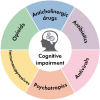Drugs with a negative impact on cognitive functions (Part 2): drug classes to consider while prescribing in CKD patients
- PMID: 38046029
- PMCID: PMC10689198
- DOI: 10.1093/ckj/sfad239
Drugs with a negative impact on cognitive functions (Part 2): drug classes to consider while prescribing in CKD patients
Abstract
There is growing evidence that chronic kidney disease (CKD) is an independent risk factor for cognitive impairment, especially due to vascular damage, blood-brain barrier disruption and uremic toxins. Given the presence of multiple comorbidities, the medication regimen of CKD patients often becomes very complex. Several medications such as psychotropic agents, drugs with anticholinergic properties, GABAergic drugs, opioids, corticosteroids, antibiotics and others have been linked to negative effects on cognition. These drugs are frequently included in the treatment regimen of CKD patients. The first review of this series described how CKD could represent a risk factor for adverse drug reactions affecting the central nervous system. This second review will describe some of the most common medications associated with cognitive impairment (in the general population and in CKD) and describe their effects.
Keywords: adverse drug reaction; chronic kidney disease; cognitive impairment; drug prescription; medications.
© The Author(s) 2023. Published by Oxford University Press on behalf of the ERA.
Conflict of interest statement
The authors declared no potential conflicts of interest with respect to the research, authorship and/or publication of this article.



